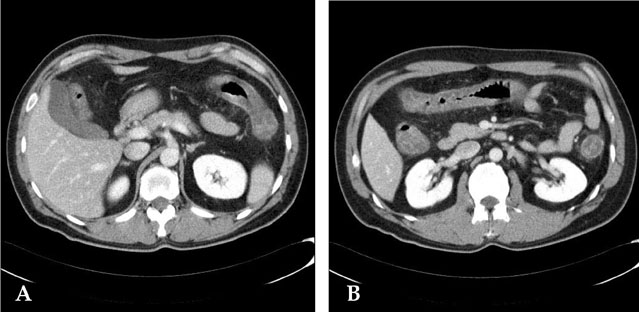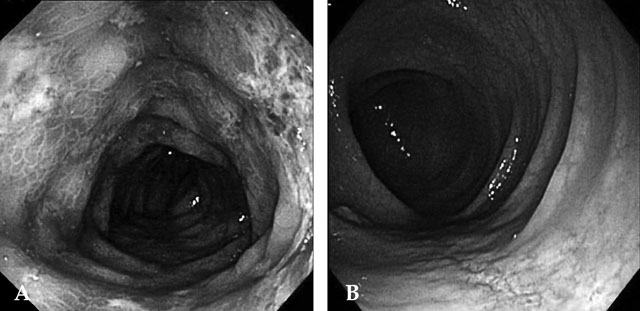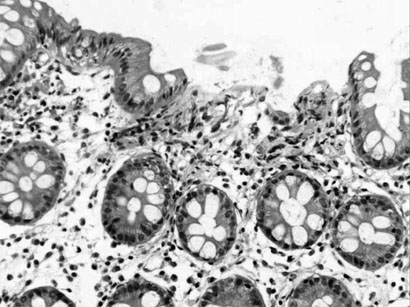Yonsei Med J.
2008 Jun;49(3):496-499. 10.3349/ymj.2008.49.3.496.
A Case of Ischemic Colitis Associated with the Herbal Food Supplement Ma Huang
- Affiliations
-
- 1Department of Internal Medicine, Ewha Medical Research Institute, Ewha Womans University School of Medicine, Seoul, Korea. shimkn@ewha.ac.kr
- KMID: 724267
- DOI: http://doi.org/10.3349/ymj.2008.49.3.496
Abstract
- Ischemic colitis is a condition that usually occurs in the elderly, as a form of vascular disease. However, ischemic colitis also occurs, though rarely, in healthy young adults. Moreover, food supplements containing Ephedra sinica or ma huang have been linked to adverse central nervous and cardiovascular events. A 40-year-old man was admitted to our emergency department after 2 episodes of abdominal pain and bloody diarrhea that lasted 24 hours. His medical history was unremarkable for risk factors of bowel ischemia, except for well-controlled hypertension. However, a weight-loss supplement, Ephedra sinica, had been prescribed for daily use during the previous month. Both abdominal/pelvic computed tomography and colonoscopy revealed findings compatible with ischemic colitis. His conditions spontaneously improved without any serious complications, and he was advised to discontinue the use of herbal medications containing ephedrine. In this paper, we describe a case of ischemic colitis that was potentially linked to the use of ma huang with a review of the relevant literature.
Keyword
MeSH Terms
Figure
Reference
-
1. Sreenarasimhaiah J. Diagnosis and management of intestinal ischaemic disorders. BMJ. 2003. 326:1372–1376.
Article2. MacDonald PH. Ischaemic colitis. Best Pract Res Clin Gastroenterol. 2002. 16:51–61.
Article3. Pittler MH, Schmidt K, Ernst E. Adverse events of herbal food supplements for body weight reduction: systematic review. Obes Rev. 2005. 6:93–111.
Article4. Haller CA, Benowitz NL. Adverse cardiovascular and central nervous system events associated with dietary supplements containing ephedra alkaloids. N Engl J Med. 2000. 343:1833–1838.
Article5. Ryan CK, Reamy B, Rochester JA. Ischemic colitis associated with herbal product use in a young woman. J Am Board Fam Pract. 2002. 15:309–312.6. Shekelle PG, Hardy ML, Morton SC, Maglione M, Mojica WA, Suttorp MJ, et al. Efficacy and safety of ephedra and ephedrine for weight loss and athletic performance: a meta-analysis. JAMA. 2003. 289:1537–1545.
Article7. Krome CN, Tucker AM. Cardiac arrhythmia in a professional football player: Was ephedrine to blame? Phys Sportsmed. 2003. 31:21–25. 298. Rezkalla SH, Mesa J, Sharma P, Kloner RA. Myocardial infarction temporally related to ephedra-a possible role for the coronary microcirculation. WMJ. 2002. 101:64–66.9. Naik SD, Freudenberger RS. Ephedra-associated cardiomyopathy. Ann Pharmacother. 2004. 38:400–403.
Article10. Chen C, Biller J, Willing SJ, Lopez AM. Ischemic stroke after using over the counter products containing ephedra. J Neurol Sci. 2004. 217:55–60.
Article11. Charatan F. Ephedra supplement may have contributed to sportsman's death. BMJ. 2003. 326:464.
Article12. Kalman D, Incledon T, Gaunaurd I, Schwartz H, Krieger D. An acute clinical trial evaluating the cardiovascular effects of an herbal ephedra-caffeine weight loss product in healthy overweight adults. Int J Obes Relat Metab Disord. 2002. 26:1363–1366.
Article13. Haller CA, Jacob P 3rd, Benowitz NL. Pharmacology of ephedra alkaloids and caffeine after single-dose dietary supplement use. Clin Pharmacol Ther. 2002. 71:421–432.
Article14. McBride BF, Karapanos AK, Krudysz A, Kluger J, Coleman CI, White CM. Electrocardiographic and hemodynamic effects of a multicomponent dietary supplement containing ephedra and caffeine: a randomized controlled trial. JAMA. 2004. 291:216–221.
Article15. Jellin JM, Gregory P, Batz F, Hitchens K, editors. Ephedra. Natural medicines comprehensive database. 2000. 3rd ed. Stockton, CA: Therapeutic Research Faculty;400–403.16. Lichtenstein GR, Yee NS. Ischemic colitis associated with decongestant use. Ann Intern Med. 2000. 132:682.
Article17. Dowd J, Bailey D, Moussa K, Nair S, Doyle R, Culpepper-Morgan JA. Ischemic colitis associated with pseudoephedrine: four cases. Am J Gastroenterol. 1999. 94:2430–2434.
Article18. Comay D, Ramsay J, Irvine EJ. Ischemic colitis after weight-loss medication. Can J Gastroenterol. 2003. 17:719–721.
Article
- Full Text Links
- Actions
-
Cited
- CITED
-
- Close
- Share
- Similar articles
-
- Myopathy Following Ingestion of Ma-huang (Ephedra)-based Herbal Remedy
- A Case of Right Side Ischemic Colitis Associated with Herbal Medication for Weight Reduction in a Young Woman
- Quantitative Analysis and Enantiomeric Separation of Ephedra Alkaloids in Ma Huang Related Products by HPLC-DAD and UPLC-MS/MS
- Ischemic Colitis
- A Case of Oral-contraceptive Related Ischemic Colitis in Young Woman




